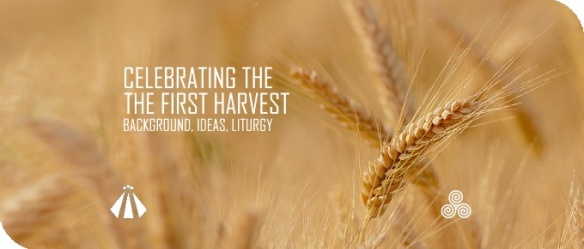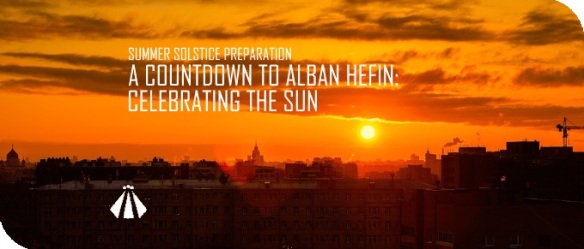
Harvest? Here are a few words about the first harvest of the year, its background and history, and its importance to you and I, and there are few suggestions about how we can celebrate it.
I can vividly remember as a wee lad, so this is going back a few years, the time when, each year, there would a ‘buzz’, a hubbub, a huge excitement at primary school like no other. Apart from Easter and Christmas, Harvest was such an important time. At school, many of our lessons, especially art, focussed on a harvest theme. And within a day of two the school hall and classes were festooned with drawings, painting and items all made by pupils with harvest time in mind. Then, bread, corn dollies and garlands decorated the hall, along with parcels of food for the elderly. Wonderful memories.
We plough the fields, and scatter the good seed on the land, but it is fed and watered by God’s almighty hand… (Hymn by Matthias Claudius, Translated by Jane Montgomery Campbell, and one of my favourite, seasonal, hymns at primary school.)
And guess what? Yes, it’s nearly that time, again.
I can’t wait for the ancient Celtic and Druid festival of Lammas, also called Lammas-Day or the season, Lammastide, or Lughnasadh. In Wales it is known as Gŵyl Awst. It traditionally starts on August 1st, and it is the first harvest in the calendar. It is such an important occasion. So important that many, latter-day and Druids, ancient cultures and others celebrate two (and sometimes three) harvests each year. This harvest is the grain harvest.
Although many churches celebrate (one) harvest, now, one Sunday in September, that type of harvest celebration service is fairly recent: it began in 1843, when Revd. Hawker, then the Vicar of Morwenstow in Cornwall, revived the ‘forgotten’ and ancient service of Lammas, as a once-a-year (new) service. We owe a debt of gratitude to him for that.
However, if we view that September harvest as the second harvest, a harvest of berries, applies, and wine, then… there’s more. It will soon be the first harvest, the grain harvest.
The Celts originally called this time, ‘lughnasadh’ (pronounced ‘loo-nas-sah’) after the ancient Gaelic deity, Lugh. But, it seems that believe ‘travelled’, and many believe the area in London now called Ludgate, is a derivation of Lugh.
‘In seed time learn, in harvest teach, in winter enjoy.’ William Blake
But many call this harvest Lammas , after the Anglo-Saxon festival of hlaefmass – loaf mass. And it’s from that word that we get the word Lammas! It was the grain harvest, hence the reference to bread, and the baking of bread to celebrate the season.
So, my late grandmother, a great one for making home-made food would, especially at this time, would bake bara brith – Welsh for ‘speckled bread’. It’s similar to the Irish loaf, barmbrack. Bara brith , is pronounced ‘barrah-bri(d)th.’ And, it’s now available in many of the larger supermarkets in the UK.
Lammas, then, is a time of giving thanks to mother nature for all her grain produce, gratitude to the Source of All, the Lord of the Harvest, and a reaping of what has been sown. In previous years it was a time of fairs, trade and much merriment.
With the reaping ended, the last sheaf of corn would be made into a Corn Dolly, which was meant to embody the ‘spirit of the season’ (in much the same way as we might display holly around the house at Christmas), or to represent the ancient corn goddess. The Corn Dolly could, though not always, be made in the form of a miniature human, but it could also be an intricate spiral pyramid, or a miniature sheaf etc. Other designs could include animals, agriculture tools like scythes and shepherds’ crooks, or objects with a Christian significance such as bells or a cross.
How will you celebrate Llughnasadh or Lammas this year? To celebrate this first harvest you might like to choose a time during the first weekend in August, perhaps a few hours one evening?
Perhaps, you might try you hand at baking a special loaf of bread that you can share with family and friends. Or, if not, buy a granary loaf of some kind to share with them. Coupled with a nice wine or non-alcoholic fruit juice it can be a timely reminder, lasting just a few minutes, of giving gratitude to the Great Giver. A communion?
But, you might like to go for a walk in the country or city park, and pause, and as you sit there gazing, meditate and give thanks, silently for a few minutes.
You might like to recite a formal liturgy that can be said by you and meal guests, or by yourself, in which case the following may be of use (to use as it is, or adapt):
Blessed are you, Fruitful One
giver of abundance and plenty,
giver of resources when stocks are low.
Grow my faith in your providence…(Tess Ward, The Celtic Wheel Of The Year)
And/or,
(Facing north)
Remembering the element of earth,
the land on which I/we tread,
from which all things grow.
May your bounty be ever present on the earth for all.
So shall I/we honour the Great Provider.(You might like to pause and imagine earth energy from which all things grow within yourself and your connection to it, flowing to you and others)
(Facing west)
Remembering to the element of air,
the energy of the mind and wind,
from which the seed is spread and planted.
May your bounty be ever present on the earth for all.
So shall I/we honour the Great Provider.(You might like to imagine the energy of the air surrounding you and sustaining all life, breathing deeply and slowly as you so. Air! Breath! Life!)
(Facing south)
Remembering the element of fire,
the spirit of creation, and destruction and new life,
the sun’s life-giving warmth.
May your bounty be ever present on the earth for all.
So shall I/we honour the Great Provider.(You might like to imagine the fire of the setting sun that fuels all creation and which reflects your spirit)
(Facing west)
Remembering to the element of water,
the energy of emotions,
that grew the crops that nourish me/us.
May your bounty be ever present on the earth for all.
So shall I/we honour the Great Provider.(You might like to think of swimming in the ocean or a pool, remembering that wonderful cleansing and rejuvenating feeling, and give thanks)
[You can vary any of this, and indeed as you work through the compass points, to start, you might like to start at another cardinal point other than north.]
(Tadhg Jonathan)
And/or,
Generous One of the Harvest,
walk alongside those who have sown in tears,
who have scattered seed without hope,
on land not of their choosing.
Come close to those who weep this day.(Tess Ward, The Celtic Wheel Of The Year)
And/or,
Thou thyself my reaping,
each ridge, and plain, and field,
each sickle curved, shapely hard,
each ear and handful in the sheaf,
each ear and handful in the sheaf.(Book: Carmina Gadelica)
And so, this Lammastide, as it has been since I was a child, I’ll be baking several bara brith, and sharing one – yes, the breaking of bread with family and friends – in a simple, ‘after meal’ remembrance ‘feast’, remembering all the good things that have happened this year, and giving thanks, in silence and humility, to the Source of All for the harvest, for life itself.
Maybe, next time you’ll join me?

 For many people today, and certainly in ages past the four compass points were important to daily life and ritual. Those four points represent winter (north), spring (east), summer (south) and autumn (west). Tonight I have the sun, summer, fire, the south in mind as we are in the season of summer and are racing toward the summer solstice.
For many people today, and certainly in ages past the four compass points were important to daily life and ritual. Those four points represent winter (north), spring (east), summer (south) and autumn (west). Tonight I have the sun, summer, fire, the south in mind as we are in the season of summer and are racing toward the summer solstice.